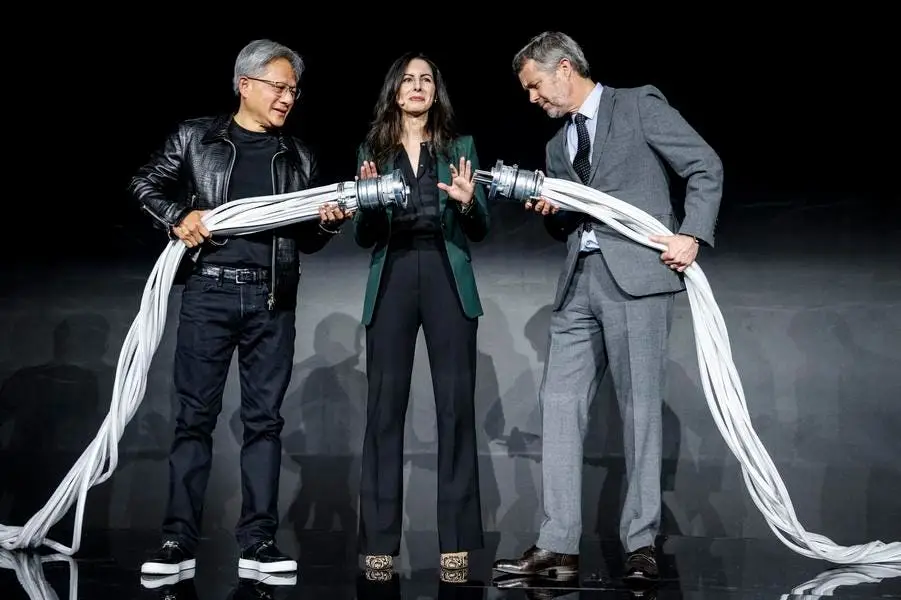King Frederik X of Denmark (R), CEO and founder of Nvidia Jensen Huang (L), and CEO of the Danish
… More
Ritzau Scanpix/AFP via Getty Images
AI and Europe: Room for Improvement
During Nvidia CEO Jensen Huang’s recent European tour, he aligned with the EU’s goal of achieving “sovereign AI”. For Nvidia, Europe’s digital sovereignty ambitions translate into greater AI infrastructure and consequently more GPUs. With the EU investing in this area, it acknowledges the necessity of reducing reliance on American and Chinese tech firms.
Investment Announcements Are Just the Beginning
Recent commitments from leaders like British Prime Minister Keir Starmer, who allocated over $1.3 billion for computing power, and French President Emmanuel Macron, who framed AI infrastructure as essential for sovereignty, reflect a positive direction. Simultaneously, Germany’s partnership with Nvidia and Deutsche Telekom to launch a new AI cloud platform is noteworthy. However, these investments, while significant, are inadequate.
Steps for Europe to Achieve Sovereign AI
In discussions about AI advancement in the EU with Lucilla Sioli, the new Director of the European AI office, I outlined critical strategies for enhancing Europe’s position in AI beyond monetary investments:
1. Accept the Paradigm Shift
AI represents a fundamental change in knowledge creation and application, not merely a quicker search engine. Regulators should avoid trying to fit AI into outdated legal frameworks. Attempts to classify Google as a publisher due to its evolving technology miss the essential reality: new landscapes demand new leaders.
2. Reduce Risks to Encourage Innovation
The U.S. thrived during the internet era partly due to legal protections like Section 230, which insulated platforms from liability. A similar approach is necessary in Europe to foster a safe space for startups to innovate without fear of legal repercussions, unlike heavy regulations in countries like Spain.
3. Lower Regulatory Hurdles
While GDPR set a precedent for privacy, it has also created barriers to innovation. Startups often choose to divert their focus to less regulated markets, as compliance can be daunting. A balanced approach is essential for fostering growth without compromising protection.
4. Foster Competition by Breaking Barriers
In Europe, tech giants benefit from scale and network effects. Encouraging data portability could level the playing field and enhance competition, allowing users to transfer their data across platforms easily, which could stimulate market activity.
Enhancing Data Accessibility and Fostering Talent
The EU’s “data spaces” initiative, although well-intentioned, tends to complicate rather than simplify access. Given that data is crucial for AI development, unrestricted access is vital. Countries like Japan have successfully adopted bold measures to allow training on copyrighted data without incurring legal challenges.
5. Promote Open Access to AI Weights
Because the potential of large language models lies in their weights, Europe could require companies to share these weights transparently. This could empower startups to innovate using shared resources rather than starting from scratch.
6. Cultivate Talent and Adoption
Europe’s development is hampered not by a lack of intelligence but by insufficient investment in education and training. Unlike self-driving cars in San Francisco, which are impactful in practice, European initiatives are still in hypothetical stages.
7. Redefine Attitudes Toward Failure
Entrepreneurs in Europe face penalties for failure, contrasting sharply with the U.S., where failure is often recognized as a learning opportunity. Reforms such as bankruptcy laws are necessary to provide second chances for those who take risks.
Looking Forward
It is crucial to recognize that Europe has lagged in previous digital revolutions; however, AI presents a unique opportunity to leverage its strengths in academic success and a robust industrial foundation. Nvidia’s engagement indicates willingness to assist. Nonetheless, Europe must reduce barriers, foster innovation, and build talent for a genuine chance at success in the AI sphere.



